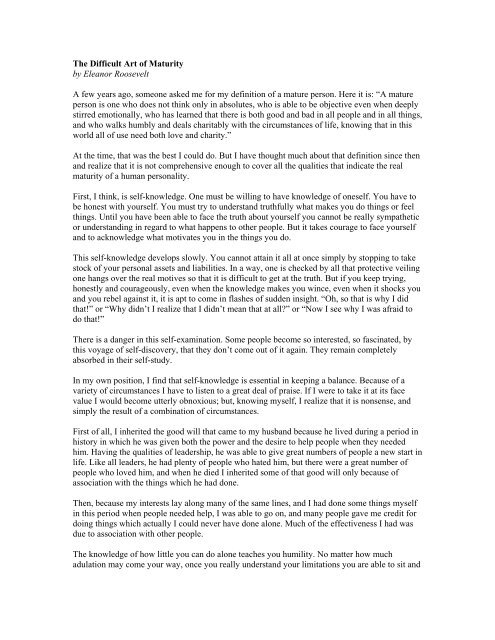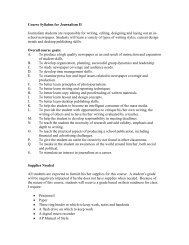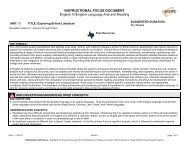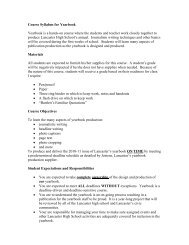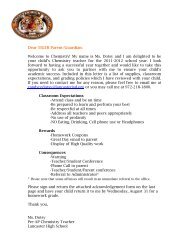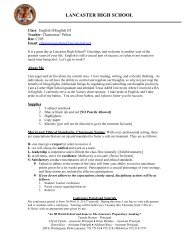The Difficult Art of Maturity by Eleanor Roosevelt A few years ago ...
The Difficult Art of Maturity by Eleanor Roosevelt A few years ago ...
The Difficult Art of Maturity by Eleanor Roosevelt A few years ago ...
You also want an ePaper? Increase the reach of your titles
YUMPU automatically turns print PDFs into web optimized ePapers that Google loves.
<strong>The</strong> <strong>Difficult</strong> <strong>Art</strong> <strong>of</strong> <strong>Maturity</strong><br />
<strong>by</strong> <strong>Eleanor</strong> <strong>Roosevelt</strong><br />
A <strong>few</strong> <strong>years</strong> <strong>ago</strong>, someone asked me for my definition <strong>of</strong> a mature person. Here it is: “A mature<br />
person is one who does not think only in absolutes, who is able to be objective even when deeply<br />
stirred emotionally, who has learned that there is both good and bad in all people and in all things,<br />
and who walks humbly and deals charitably with the circumstances <strong>of</strong> life, knowing that in this<br />
world all <strong>of</strong> use need both love and charity.”<br />
At the time, that was the best I could do. But I have thought much about that definition since then<br />
and realize that it is not comprehensive enough to cover all the qualities that indicate the real<br />
maturity <strong>of</strong> a human personality.<br />
First, I think, is self-knowledge. One must be willing to have knowledge <strong>of</strong> oneself. You have to<br />
be honest with yourself. You must try to understand truthfully what makes you do things or feel<br />
things. Until you have been able to face the truth about yourself you cannot be really sympathetic<br />
or understanding in regard to what happens to other people. But it takes courage to face yourself<br />
and to acknowledge what motivates you in the things you do.<br />
This self-knowledge develops slowly. You cannot attain it all at once simply <strong>by</strong> stopping to take<br />
stock <strong>of</strong> your personal assets and liabilities. In a way, one is checked <strong>by</strong> all that protective veiling<br />
one hangs over the real motives so that it is difficult to get at the truth. But if you keep trying,<br />
honestly and courageously, even when the knowledge makes you wince, even when it shocks you<br />
and you rebel against it, it is apt to come in flashes <strong>of</strong> sudden insight. “Oh, so that is why I did<br />
that!” or “Why didn’t I realize that I didn’t mean that at all?” or “Now I see why I was afraid to<br />
do that!”<br />
<strong>The</strong>re is a danger in this self-examination. Some people become so interested, so fascinated, <strong>by</strong><br />
this voyage <strong>of</strong> self-discovery, that they don’t come out <strong>of</strong> it again. <strong>The</strong>y remain completely<br />
absorbed in their self-study.<br />
In my own position, I find that self-knowledge is essential in keeping a balance. Because <strong>of</strong> a<br />
variety <strong>of</strong> circumstances I have to listen to a great deal <strong>of</strong> praise. If I were to take it at its face<br />
value I would become utterly obnoxious; but, knowing myself, I realize that it is nonsense, and<br />
simply the result <strong>of</strong> a combination <strong>of</strong> circumstances.<br />
First <strong>of</strong> all, I inherited the good will that came to my husband because he lived during a period in<br />
history in which he was given both the power and the desire to help people when they needed<br />
him. Having the qualities <strong>of</strong> leadership, he was able to give great numbers <strong>of</strong> people a new start in<br />
life. Like all leaders, he had plenty <strong>of</strong> people who hated him, but there were a great number <strong>of</strong><br />
people who loved him, and when he died I inherited some <strong>of</strong> that good will only because <strong>of</strong><br />
association with the things which he had done.<br />
<strong>The</strong>n, because my interests lay along many <strong>of</strong> the same lines, and I had done some things myself<br />
in this period when people needed help, I was able to go on, and many people gave me credit for<br />
doing things which actually I could never have done alone. Much <strong>of</strong> the effectiveness I had was<br />
due to association with other people.<br />
<strong>The</strong> knowledge <strong>of</strong> how little you can do alone teaches you humility. No matter how much<br />
adulation may come your way, once you really understand your limitations you are able to sit and
listen to praise and feel quite detached, as though you were looking at the picture <strong>of</strong> someone<br />
else.<br />
It is easy for us to be quite misled about ourselves, about our bad qualities as well as our good.<br />
And it is impossible to proceed with the right motives instead <strong>of</strong> the wrong ones as long as we<br />
have any serious misconception about ourselves.<br />
If you have established the right motives it will help you greatly in assessing other people. You<br />
can never do this on a sound basis while you are deceived in regard to yourself. This is basic in<br />
dealing with young people. If you see your own motives clearly, you will find it much easier to<br />
lead the young to an understanding <strong>of</strong> what makes them do the things they do.<br />
It is curious that many people seem to fear self-knowledge because they assume, and <strong>of</strong>ten quite<br />
wrongly, that it implies discovering only derogatory things about oneself. Actually, an important<br />
part <strong>of</strong> self-knowledge is that it gives one a better realization <strong>of</strong> the inner strength that can be<br />
called upon, <strong>of</strong> which one may be quite unaware. Because it is easier to say, “I can’t,” than “I<br />
can,” or at least “I can try,” many people go through life unaware <strong>of</strong> untapped strength, even<br />
untapped ability. <strong>The</strong>y haven’t explored their own capabilities. <strong>The</strong>y really don’t know where<br />
their strength lies. When I was a young girl, I was quite sure that unless someone provided me<br />
with a livelihood I would be helpless. All I could think <strong>of</strong> that I was capable <strong>of</strong> doing was to be a<br />
housemaid or a nurse to children. I did not think I could cook, because I had never done it. I had<br />
to learn <strong>by</strong> doing and I believe I would never have learned had certain things not been forced<br />
upon me.<br />
You see this inability to make a real self-assessment quite <strong>of</strong>ten in other people, if not in yourself.<br />
A neighbor, perhaps, may be doggedly trying to follow some occupation that is wrong for him<br />
because, quite honestly, he is unaware <strong>of</strong> his particular strength or forte, though it may be<br />
glaringly obvious to other people.<br />
Of course, there is always the more painful necessity <strong>of</strong> becoming aware <strong>of</strong> one’s own limitations<br />
and learning to accept them. Perhaps one <strong>of</strong> the most difficult things any <strong>of</strong> us has to do is to be<br />
able to say clearly, “This is a limitation in me. Here is a case where, because <strong>of</strong> some lack <strong>of</strong><br />
experience or some personal incapacity, I cannot meet a situation; I cannot meet the need <strong>of</strong><br />
someone who I dearly love, my husband or my children.”<br />
You have not sufficient experience to understand the need or you have not grown enough or you<br />
are still tied <strong>by</strong> some limitation you do not recognize and so you cannot help. I think everyone, at<br />
some time in his life, has this happen to him, comes face to face with the bitter realization that he<br />
has failed in something that means a tremendous amount and probably in a relation that is close to<br />
him.<br />
Life teaches you that you cannot attain real maturity until you are ready to accept this harsh<br />
knowledge, this limitation in yourself, and make the difficult adjustment. Either you must learn to<br />
allow someone else to meet the need, without bitterness or envy, and accept it; or somehow you<br />
must make yourself learn to meet it. If you refuse to accept the limitation in yourself, you will be<br />
unable to grow beyond this point. <strong>The</strong>re is nothing easy about this problem, no easy way <strong>of</strong><br />
accepting and acknowledging your limitation, no easy way <strong>of</strong> swallowing the unpalatable fact<br />
that someone else must meet the need, if you have failed. But it must be done. If you refuse to do<br />
it, you will become dishonest with yourself, making a pretense that the limitation is not there, that<br />
you have not failed. But the situation has remained unsolved and the deception fools only<br />
yourself.
<strong>The</strong>re is another ingredient <strong>of</strong> the maturing process that is almost as painful as accepting your<br />
own limitations and the knowledge <strong>of</strong> what you are unable to give. That is learning to accept what<br />
other people are unable to give you. You must learn not to demand the impossible or to be upset<br />
when you do not get it.<br />
Self-knowledge helps in this because when you understand yourself clearly it is easier for you to<br />
understand more clearly the people whom you love. Let me give you an example <strong>of</strong> how one<br />
young woman learned to deal with a personal relationship when she had realized and faced the<br />
limitations that were involved. Her husband forgot their wedding anniversary and the children’s<br />
birthdays and she was much hurt. <strong>The</strong>n she faced the fact that his life was busy, he was engrossed<br />
in matters <strong>of</strong> great importance. If he neglected to do the things she wanted and had expected <strong>of</strong><br />
him, it was not because he did not want to make her happy, it was because there was so much else<br />
on his mind.<br />
She learned to handle the situation <strong>by</strong> giving him subtle reminders a <strong>few</strong> days before each<br />
anniversary, so that he would not overlook them. She would leave a casual note for him, saying,<br />
“Four days from now is our anniversary. Could we plan a little time together?” Or, if she knew he<br />
was going on a trip, she would say, “Can you change it for a <strong>few</strong> days? This is our anniversary<br />
and we like to be together.”<br />
It was never a repro<strong>of</strong> or a suggestion that he had been inadequate, but simply a reminder that this<br />
was something they would both like to remember and she just happened to have it in mind.<br />
When she learned to understand the situation she was able to prevent the children from being<br />
upset because Daddy had forgotten. A <strong>few</strong> days before a birthday she would say casually, “Do<br />
you remember how pleasant the day was when Johnny was born?” It was a back-handed<br />
reminder. He knew what she was doing and he was grateful.<br />
How much worse it would have been if she had waited for the anniversary and then said, “You<br />
have forgotten that this is my birthday.” This would have given him a sense <strong>of</strong> guilt and made the<br />
day unhappy for them both.<br />
So it is a major part <strong>of</strong> maturity to accept not only your own shortcomings but those <strong>of</strong> the people<br />
you love, and help them not to fail when you can. <strong>The</strong>re is another and perhaps greater danger<br />
involved in this matter <strong>of</strong> accepting the limitations <strong>of</strong> others. Sometimes we are apt to regard as<br />
limitations qualities that are actually the other person’s strength. We may resent them because<br />
they are not the particular qualities which we may want the other person to have. <strong>The</strong> danger lies<br />
in the possibility that we will not accept the person as he is but try to make him over according to<br />
our own ideas.<br />
I think one <strong>of</strong> the basic things to recognize is that the only valuable development is the<br />
development <strong>of</strong> an individual. If you try to change that individual so that he loses his personality,<br />
you have done something that has destroyed the most important thing about a human being, his<br />
essential difference from anybody else. Any one <strong>of</strong> use who tries to make someone over and force<br />
him into an image <strong>of</strong> what we think he should be, rather than encourage him to develop along his<br />
own lines, is doing a dangerous thing. Sooner or later, an individual will rebel if the effort is<br />
made to pour him into a mold for which he has no affinity. True, you can sometimes stop or<br />
cripple the full development <strong>of</strong> a personality but I do not think it is ever accomplished without<br />
deep resentment on the part <strong>of</strong> the person.
I have seen parents who use sarcasm and every kind <strong>of</strong> pressure they can bring to bear to change<br />
their children and force them into the patter <strong>of</strong> which they approve. Sometimes I have seen<br />
parents make a tremendous effort to have their children become what they themselves had wanted<br />
to be and for some reason had failed to achieve. Or they may have a great, though<br />
unacknowledged, desire to hold the child close to them and, through the child, attain a sort <strong>of</strong><br />
continuity with the future, and know their own work will be carried on. Sometimes they succeed,<br />
but at the cost <strong>of</strong> rebellion and the actual destruction <strong>of</strong> what was essentially individual in the<br />
person.<br />
At some point, a strong individual will usually break away and follow what he believes to be his<br />
own necessary development. But it may be only after much harm has been done and at the cost <strong>of</strong><br />
much pain in the human relationship.<br />
<strong>The</strong> only way in which we can really help people to develop is to let them do it themselves, trying<br />
to show them <strong>by</strong> demonstration, if we can, the things that are really needed. But to force anything<br />
upon an individual is rarely successful in helping him develop his own individuality.<br />
Everyone should be made to feel that it is an important thing to develop his true nature. We<br />
should not compare ourselves with others; certainly we should not imitate them. I have <strong>of</strong>ten<br />
noticed that the person who has followed his true bend has more self-respect than the one who<br />
has been forced into an alien mold. And without self-respect, <strong>few</strong> people are able to feel genuine<br />
respect for others.<br />
Just as we must learn to accept the limitations <strong>of</strong> others, so we must learn never to demand <strong>of</strong><br />
someone else what is not freely <strong>of</strong>fered us. This can apply to one’s husband or wife, to one’s<br />
children, particularly after they have left home, to one’s friends. What is freely given to love or<br />
affection or companionship one should rightly rejoice in. But what is withheld one must not<br />
demand.<br />
<strong>The</strong>re are, <strong>of</strong> course, many ways <strong>of</strong> making such a demand, and the worst ways are not<br />
necessarily the overt ones, the open complaints, the querulous insistence. One can demand <strong>by</strong><br />
implied appeals to sympathy and to duty, <strong>by</strong> pathos and helplessness and, in extreme cases, <strong>by</strong><br />
illness.<br />
This kind <strong>of</strong> demand is a form <strong>of</strong> spiritual blackmail and it sometimes develops into a<br />
ruthlessness, an emotional pressure which is essentially dishonest. It is not, unhappily, uncommon.<br />
People <strong>of</strong>ten refuse to recognize it in themselves. <strong>The</strong>y regard themselves as abused,<br />
ill treated, neglected, everything, in fact, but what they are—attempting to get <strong>by</strong> force something<br />
that people are unwilling to give them. If they refuse to correct this tendency, then at least their<br />
victims must learn to resist steadily and firmly the assaults <strong>of</strong> this spiritual blackmailer.<br />
<strong>Maturity</strong> means, too, an ability to take criticism and evaluate it. When it is not <strong>of</strong> value, when it<br />
is not constructive, but destructive, one can forget it. But when it is constructive one must accept<br />
it and try to pr<strong>of</strong>it, even though hurt <strong>by</strong> it. Perhaps you were hurt because a certain person<br />
pointed out a fault and you did not want that person to think you had a fault. But, if you are<br />
mature enough, you will accept the criticism <strong>of</strong> those you love and who love you and learn from<br />
it.<br />
<strong>The</strong>re is much criticism, <strong>of</strong> course, that comes to anyone who lives his life more or less before the<br />
public. Some <strong>of</strong> it may be entirely justified. Some <strong>of</strong> it, you may <strong>of</strong>ten feel, is unfair. In my own
case, it is the criticism not <strong>of</strong> myself alone but <strong>of</strong> my husband and my family which has to be<br />
considered and evaluated and accepted.<br />
If you consider that you are being criticized <strong>by</strong> someone who is seeking knowledge and has an<br />
open mind, then you naturally feel you must try to meet that criticism, that you must try to make<br />
an explanation, which may or may not satisfy the critic. But if you feel that the criticism is made<br />
out <strong>of</strong> sheer malice and that no amount <strong>of</strong> explanation will change a point <strong>of</strong> view which has<br />
nothing to do with the facts, then the best thing is to put it out <strong>of</strong> your mind entirely, as though it<br />
did not touch you or your loved ones in any way.<br />
For some people this is hard to do. In fact, I know some for whom it is impossible. But I find<br />
that you can close the door and turn to other things, knowing that nothing can be achieved <strong>by</strong><br />
giving any further attention to it.<br />
Another sign <strong>of</strong> maturity is gradually to eliminate the faults you see in yourself but that no one<br />
else knows exist. If no one else is conscious <strong>of</strong> a failing we have, a great many <strong>of</strong> us are apt to<br />
hide it instead <strong>of</strong> trying to eliminate it. We are glossing over something instead <strong>of</strong> honestly trying<br />
to get rid <strong>of</strong> it. Saying to yourself, “Well, after all, nobody knows,” is no solution. Because you<br />
know.<br />
<strong>Maturity</strong> also means that you have set your values, that you know what you really want out <strong>of</strong><br />
life. What are the things that give you great satisfaction? I know my satisfaction is not in politics,<br />
not in the interesting things I do. It is in being with people I am fond <strong>of</strong> and feeling that in some<br />
small way I can make life happier or more interesting for them, or help them achieve their<br />
objective. To me that is much more important than anything else in my life.<br />
To be mature you have to realize what you value most. It is extraordinary to discover that<br />
comparatively <strong>few</strong> people reach this level <strong>of</strong> maturity. <strong>The</strong>y seem never to have paused to<br />
consider what has value for them. <strong>The</strong>y spend great effort and sometimes make great sacrifices<br />
for values that, fundamentally, meet no real needs <strong>of</strong> their own. Perhaps they have imbibed the<br />
values <strong>of</strong> their particular pr<strong>of</strong>ession or job, <strong>of</strong> their community or their neighbors, <strong>of</strong> their parents<br />
or family. Not to arrive at a clear understanding <strong>of</strong> one’s own values is a tragic waste. You have<br />
missed the whole point <strong>of</strong> what life is for.


